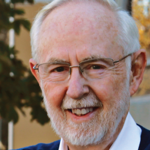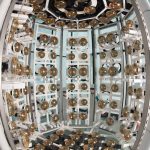From UC Riverside, Dec. 4, 2019: The University of California, Riverside is participating in the international Deep Underground Neutrino Experiment, which brings together more than 1,000 scientists from around the world to learn more about ghostly particles called neutrinos.
neutrino
From The Mac Observer, Nov. 25, 2019: In this 30-minute podcast episode, Fermilab scientist Dan Hooper recounts how he caught the astrophysics bug as an undergraduate, landed a postdoc position at Oxford and was later hired at Fermilab. He chats about his interest in the interface between particle physics and cosmology, dark matter and what neutrinos can tell us about the early universe.
From University of Bristol, Nov. 21, 2019: The University of Bristol will receive up to £1.1 million to research matter and antimatter as part of DUNE, a global science experiment hosted by Fermilab that will inform the debate about why the universe survived the Big Bang.
From the University of Warwick, Nov. 21, 2019: The University of Warwick has received over £900,000 to provide essential contributions to the international Deep Underground Neutrino Experiment, hosted by Fermilab, which aims to answer fundamental questions about our universe. The investment from UK Research and Innovations’ Science and Technology Facilities Council is a four-year construction grant to 13 educational institutions and to STFC’s Rutherford Appleton and Daresbury laboratories.
From the University of Birmingham, Nov. 21, 2019: The UK has made a new, multimillion-pound investment in the Deep Underground Neutrino Experiment, a global science project hosted by Fermilab that brings together the scientific communities of the UK and 31 countries from Asia, Europe and the Americas to build the world’s most advanced neutrino observatory.
The Cavalier Daily, Nov. 20, 2019: University physicists are beginning to make their mark on two multimillion dollar experiments in particle physics by contributing their research analyses to experiments at Fermilab for short: the Mu2e muon experiment and the NOvA neutrino experiment. NOvA is under way, and Mu2e is scheduled to begin in 2023.
From The Atlantic, Nov. 17, 2019: Describing neutrino oscillations is notoriously tricky. The search for a shortcut by Fermilab physicist Stephen Parke, University of Chicago physicist Xining Zhang and Brookhaven National Laboratory physicist Peter Denton led to unexpected places. They ended up discovering an unexpected relationship between some of the most ubiquitous objects in math.
From Scitech Europa, Nov. 15, 2019: Researchers at the University of Manchester in the UK have been given a €7m grant from the UK Research and Innovation’s Science and Technology Facilities Council to support the university’s particle physics program for three years. The money supports, in part, participation in the international Deep Underground Neutrino Experiment, hosted by Fermilab.


